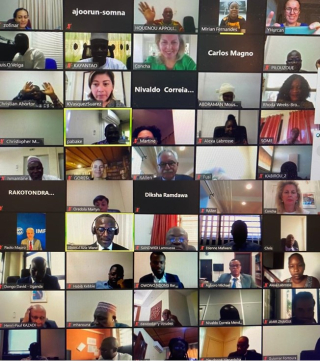
Posted by Concha Verdugo Yepes[1]
These days, there is a lot of activity in preparation for the International Anti-Corruption Day on December 9th. This year’s United Nations message focuses on “RECOVER with INTEGRITY” highlighting that only by putting effective corruption mitigation measures in place will a better recovery be possible. The message also emphasizes that inclusive COVID-19 recovery can only be achieved with integrity.
In this context, the IMF delivered its first anti-corruption training course on “Fighting Corruption in Sub-Saharan Africa” during November 16-20, 2020. The course was designed to help country authorities improve their skills in anti-corruption policy advice and analysis, including in the governance of emergency financing.
The course was organized by the IMF’s Fiscal Affairs and Legal Departments in collaboration with the Africa Training Institute. About 73 senior government officials (selected from more than 240 applicants) from 34 sub-Saharan Africa (SSA) countries participated in the course which was delivered in English, French, and Portuguese. Participants included representatives of President’s or Prime Minister’s Offices, Ministries of Finance, Revenue Authorities, Supreme Audit Institutions, Anti-Corruption Commissions, Finance Inspectorates, and other institutions shaping countries’ anti-corruption strategy and policies. One-third of participants were women, and one-third were from fragile countries. Evaluations were very positive, with some describing the anti-corruption agenda as a “last frontier” for faster development in the continent.
The course builds on the IMF’s 2018 Enhanced Framework for Governance. It identified vulnerabilities to corruption in both revenue and expenditure management. It presented red flags that can alert policy makers and oversight agencies to possible challenges and weaknesses in governance, and the potential macro-fiscal costs of corruption. The course included many examples and case studies of corruption in the SSA region and proposed potential reforms. It drew attention to the legal instruments, mechanisms, and strategies that can both prevent and prosecute corruption, and the need for a strong rule of law. Efforts to counter money laundering was another important theme. Finally, the course included several workshops with practical exercises that helped participants to strengthen their skills in anti-corruption policy advice and risk assessment.
The course included specialized contributions by 20 IMF staff and short presentations from 11 external guest speakers, including the Auditor General of Sierra Leone, staff from INTOSAI, civil society organizations (CSOs) such as the International Budget Partnership and the Global Initiative for Fiscal Transparency, and senior officials from the Republic of Congo’s Ministry of Budget, South Africa’s National Treasury, and the Director General of the Anticorruption Commission in Mauritius. The large number of micro-modules allowed experts to delve into real cases and provided an opportunity for inclusion and collaboration with authorities, CSOs and private sector experts from a diverse range of countries.
Recurring themes of the course included the existence of systemic/institutional corruption and the failure to address it. Many participants highlighted the proliferation of anti-corruption agencies to fight corruption noting that responsibilities are often badly defined or overlapping, and that coordination is inadequate. Reforms have not been effective because anti-corruption agencies and prosecutors do not have enough power and are not supported by political leadership. Second, participants noted that the definition of corruption focusing on “the abuse of powers by public officials for private gain” was too narrow: the role of the private sector – the supply side of corruption – should be included. Third, in many countries the work of the supreme audit authorities is hampered by political interference, fear of retribution, lack of resources and very weak PFM systems. In some SSA countries, however, auditors are making a strong contribution to anti-corruption policies, e.g., real time audits of emergency COVID-19 related programs.
The main takeaways from the course include interest in developing a community of practice on anti-corruption issues in SSA that would meet on a regular basis. Interest was also expressed in converting the extensive course materials into a volume of guidance materials that would benefit not only SSA countries but other regions, as most of the issues and takeaways are of global interest and applicability. The course clearly has started an important new stream of work in the Fund that needs to continue and be sustained.
[1] Senior Economist, Africa Department and formerly Fiscal Affairs Department, IMF.
Note: The posts on the IMF PFM Blog should not be reported as representing the views of the IMF. The views expressed are those of the authors and do not necessarily represent those of the IMF or IMF policy.






